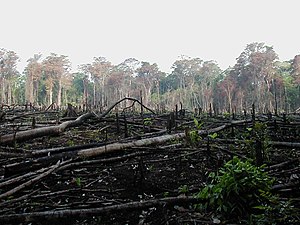European Union Proposal for Addressing Global Deforestation
by Jake Schmidt, The Environmentalist, Oct 20, 2008
The European Commission (the Commission) just released their proposal for addressing the challenges of deforestation and forest degradation to tackle climate change and biodiversity loss. This is the long awaited Communication on the European Union’s (EU’s) proposed position on global warming emissions from deforestation in the lead-up to the international climate negotiations in Copenhagen.
The lack of a specific position had caused some interesting back-and-forth between the negotiators for Papua New Guinea and the EU at the climate negotiations in Ghana. So, what clarity did the EU provide on its position as we move towards Copenhagen? (It is important to remember that this is a proposal and is not a definitive position of the EU, but rather begins to establish their negotiating position).
Serious goals for addressing deforestation are called for:
...objective to halt global forest cover loss by 2030 at the latest and to reduce gross tropical deforestation by at least 50% by 2020 compared to current levels.
Cutting deforestation loss 50% by 2020 is a similar goal to the one called for in the Eliasch Review (conducted for the United Kingdom government). This would cost an estimated €15-20 billion per year (~$20-27 billion), according to the Commission’s calculation.
Deforestation reduction credits not allowed in their emissions trading system prior to 2020 for a number of reasons including:
-- the scale of potential deforestation credits (deforestation emissions are roughly three times the total regulated emissions under the EU’s emissions trading system); and
-- unresolved monitoring, reporting, verification, and liability questions (e.g., what happens if the credited forest loss reverses due to a forest fire…who is held responsible?)
This is different than the approaches being outlined in two of the main climate proposals in the U.S.—the Boxer-Lieberman-Warner bill and the Boucher-Dingell discussion draft—which both envision that a portion of a company’s compliance could be met through the purchase of deforestation emissions reduction credits.
Major portion of EU’s funding coming from use of auction revenues from its emissions trading system (an idea proposed at the climate negotiations in Ghana). The Commission proposed that at least 20% of the proceeds from the auctioning system post-2012 be used to support climate objectives including tackling deforestation emissions. As the Commission notes, this could generate €1.5-2.5 billion (~$2-2.7 billion) per year in 2020 if 5% of the proceeds from the auction was dedicated to battling deforestation.
Deforestation and forest degradation incentive scheme under the post-2012 international agreement should be based on:
-- establishing a Global Forest Carbon Mechanism in the short-term where support would be provided based upon verified performed emissions reductions for nationwide implementation. It would be open to developing countries that ratify the future agreement and commit to take action to reduce deforestation, provided that they have effective forest governance structures and respect the rights of forest dependent populations.
-- testing the inclusion of deforestation in carbon markets in the long-term for use as compliance by EU Member States. So, while deforestation emissions reduction credits can’t count in the EU’s emissions trading system, an EU country might be able to count them towards the country’s overall emissions reduction target. This would be done only if there was an international agreement with “ambitious mid-term emissions reduction commitments” and proper resolution of other technical issues. They also proposed a new “sectoral mechanism” to avoid emissions reductions in one country simply “leaking” to other countries which aren’t participating (which is one of the reasons there has been a push to address illegal logging as I discussed here).
Addressing illegal logging. As pointed out in the Communication, the EU is a major importer of timber, a lot of which is from illegal harvests (estimated at 19% of all imports), which I highlighted here, here, and here. So, the Commission proposed:
-- Developing voluntary agreements with timber producing countries to ensure that their exports are licensed as legally harvested; and
-- A regulation to oblige EU operators to minimize the risk of illegally harvested timber and timber products entering their supply chain.
Neither of these is as strong as a requirement that all imports into the EU of wood products are certified that they are from legal harvests, as the US recently enacted and the European Parliament recently pushed.
They also proposed to study the impact of EU consumption of other products (such as meat, soybeans, and palm oil) and consider policy options to reduce the impact. Will they adopt a mechanism to address the other international drivers of deforestation?
Looking towards the Post-2012 agreement to be reached in Copenhagen. Well, it seems that there are still differences on the best mechanism to provide incentives to address deforestation emissions. The EU has signaled the potential for deforestation credits to count towards an EU country’s overall target, but only on a testing basis and definitely not linked to their emissions trading system.












No comments:
Post a Comment